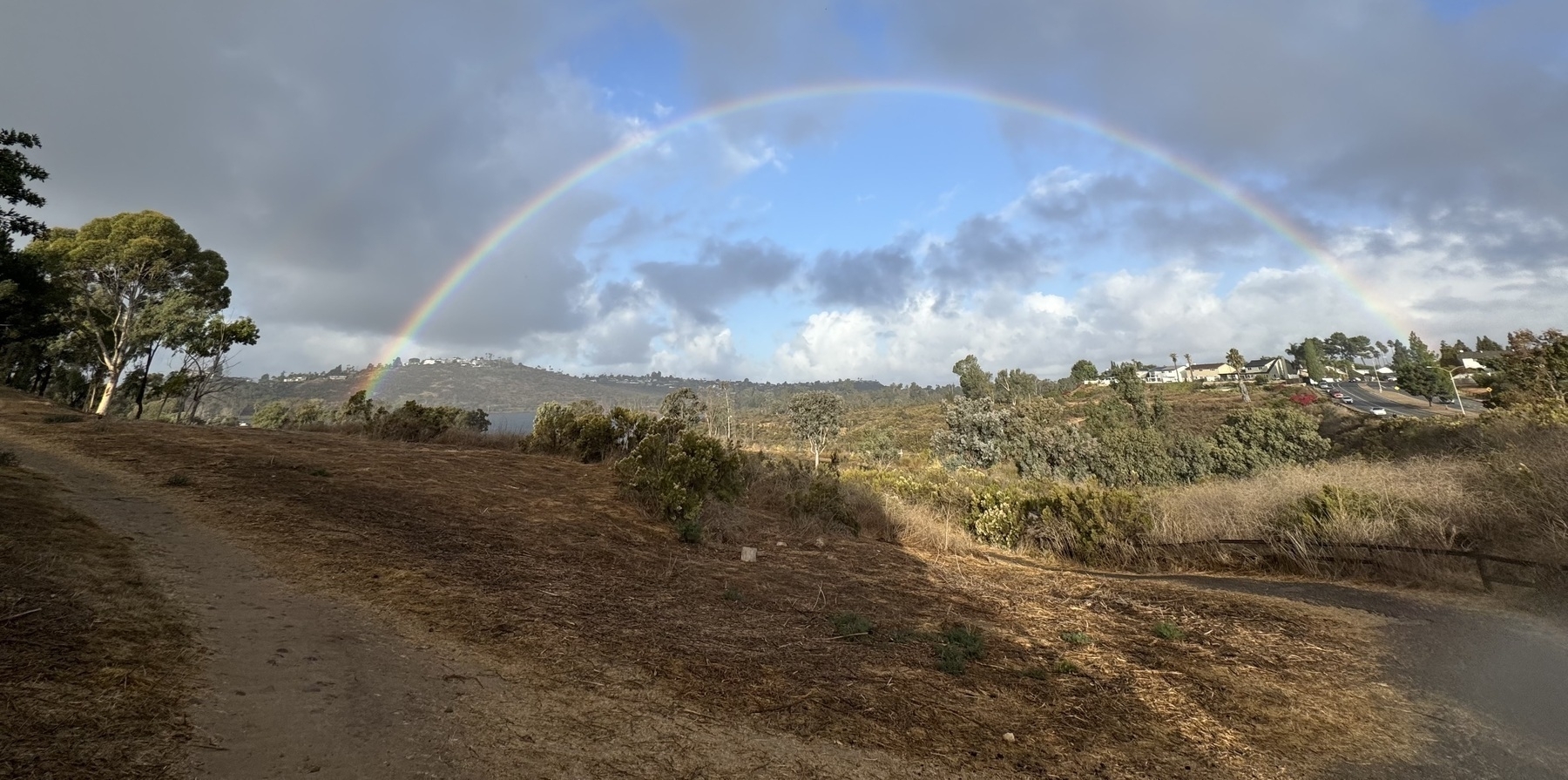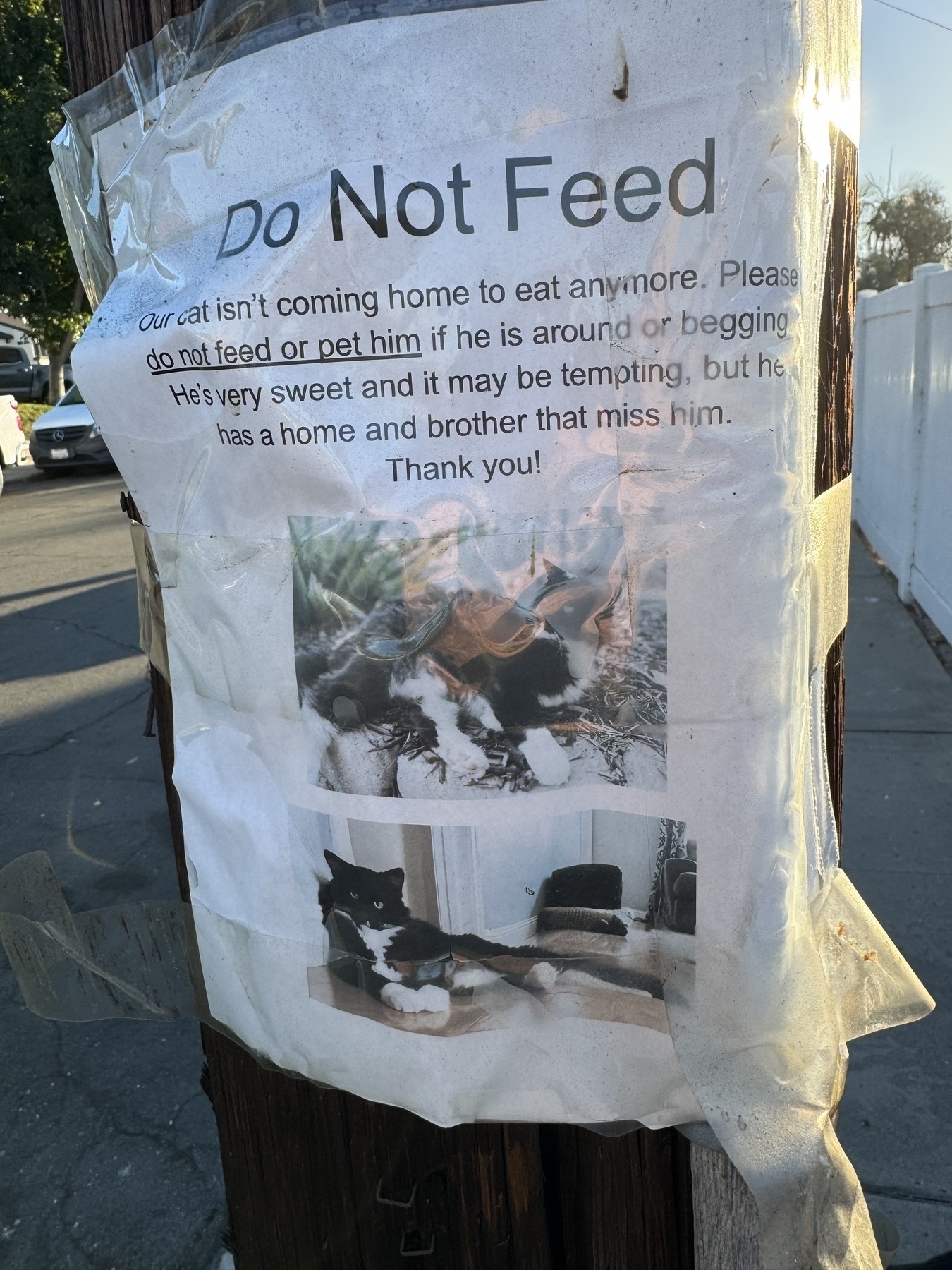Facebook is changing its primary metric to ‘views’.
Like other methods of measurement created by tech companies, “views,” “impressions,” and other metrics are arbitrary, and as any influencer knows, they can change at the drop of a hat — platforms update and encourage users to prioritize different metrics based on what’s good for the business. And right now, Meta just wants you to keep scrolling.
Stephen King quit Twitter and joined Threads. His last tweet: “I’m leaving Twitter. Tried to stay, but the atmosphere has just become too toxic. Follow me on Threads, if you like.” Here he is on Threads.
Here’s something I saw while walking with the dog this morning: This spectacular rainbow.

What’s the Deal With Pete Hegseth’s Crusader Tattoos? His body is covered in symbols celebrating violent Christian nationalism.
Why do so many people, including liberals, now hold Democrats in contempt?
I have been distinctly uncomfortable with the whole “we must find ourselves a Joe Rogan” [—] a guy’s guy who can talk to the men who we desperately need to appease in order to win elections. [Certainly, liberals and progressives do] need to adapt themselves to a new media landscape and claim some of that territory for ourselves. This is a new world and the old so-called liberal media is dysfunctional. But the canonization of the dumbshit bro talk as the the only way to do it strikes me as wishful thinking on the part of a whole lot of lefties (you know who you are) who really relate to that stuff and think the whole “girlification” of the Democrats is a drag.
These liberals think it’s a liability that “the majority of Democrats are women… Good to know.”
There needs to be some creativity here, people. Running with stupid (or pretending to) isn’t going to get it done. Looking down on the Democratic party for not being the kind of people you want to have a beer with is well… stupid. This isn’t about your social life.
And Digby quotes Josh Marshall: “Voters often want new leaders. But things are always a bit out of joint when it’s leaders who want new voters.”
Related: On Threads yesterday, journalist Taylor Lorenz asked male podcast listeners to recommend favorite podcasts that aren’t as big as Joe Rogan yet.
“Who are some of the up and coming men in the male podcast space that bros are listening to?” she asked.
I recommended Ezra Klein, Dan Savage, Everett Rummage (Age of Napoleon), John Green, Dan Carlin (Hardcore History), Tyler Cowen, Nilay Patel and David Pierce (Vergecast), Gilbert Gottfried, Casey Newton and Kevin Roose (Hard Fork), Jonathan Goldstein (Heavyweight), PJ Vogt, Ryan Broderick, Dominick Sandbrook and Tom Holland (The Rest is History), John Gruber and Ira Glass.
I was kinda trolling Lorenz a bit — because I am not a bro. I am a fucking grown-ass man. And none of those podcasters are bros. Bros are children with car keys and liquor; I want nothing to do with them.
The latest Jesus movie mixes Christianity with MMA fighting. The Forward, a Jewish publication, criticizes a movie about Jesus as a mixed martial artist for being unrealistic and historically inaccurate.
I’m Jewish myself, and I read the Forward regularly. I’m baffled why they chose to run this review of this movie. I read it, and I’m now sharing it, so maybe that’s my answer.
Tulsi Gabbard’s Nomination Is a National-Security Risk. She has vehemently and often spoken in support of Syria and Russia against the United States.
Kevin Smith's "Dogma" turns 25
“Dogma” is one of Smith’s best movies. It’s surprisingly thoughtful as well as crudely funny.
Smith is Catholic, or at least was raised in the religion. He clearly respects Catholicism and is wrestling with it.
Kevin E. G. Perry at The Independent:
"It’s a funny, funny flick, and it makes you think," said Smith. “You walk out of the movie and maybe you think about your own faith or your own spirituality, or maybe not, [but] at least you’ve been entertained.”
Also: “I always felt that – with her infinite patience – God had to be both a woman and Canadian.”
Good news for fans: Smith says there are plans to re-release the film in 2025. “Dogma” has been unavailable on streaming, and the last physical release was a Blu-Ray in 2008, because the rights are owned by Harvey Weinstein and his brother Bob.
Tyler Cowen interviews Neal Stephenson on history, spycraft, parallels between the 20th Century US and Soviet Union and more. Stephenson’s new book is Polostan, a historical novel set in the 1930s; it’s the beginning of a new series.
Photographer Susan Schiffman's charming photos of rent-stabilized apartments in New York's East Village are intended as portraits of the unseen tenants who live in them.
Anna Kodé at the New York Times:
Ms. Schiffman pointed to a photo of a white sink — surrounded by towels, dishes and a mirror — as revealing of the quotidian scenes she is hoping to document. It’s the only sink in that tenant’s apartment, said Ms. Schiffman, who also has just a single sink in her home. “You have to do everything in that sink — when we have to go to a wedding or a thing, there’s a schedule.”
Schiffman moved into her husband’s railroad-style apartment in 1997, and they’ve lived there since.
Because the apartments are rent-stabilized, landlords don’t renovate them, so the photos cross time. Many of the subjects have lived in their homes for decades. “One tenant said to the photographer, ‘I know that these are the same floorboards walked on from the time this building was built in 1898.’”
But the neighborhoods change.
One tenant who had been living in her apartment since the 1990s said to Ms. Schiffman, “At least a crack addict would say good morning to you. Now I say good morning to these young tenants and they look at me like, ‘Why are you talking to me?’”
What it means to be left wing
In the modern world there are three main ideological groupings. Broadly the right, the left, and liberals/neoliberals. These don’t appear on a line, they’re a triangle and each has something in common with the others. The left, generally speaking, is anti-war, for example, and so are parts of the right, especially paleocons. Liberals are very identity politics focused and the left has sympathy for that, but isn’t as dedicated to it. The left’s primary focus is on economic issues and relationships and the relationship to IP is more of “of course everyone should be treated equally.”
By Welsh’s definition, I’m on the left. I’m not identity-politics focused but I do strongly believe that everyone should be treated equally.
Also:
Left wingers are the opposition to capitalism. The most extreme versions want an end to it entirely, the moderate versions want it under firm control, made to contribute to mass prosperity, not turned to produce billionaires.
I’m most definitely moderate-left on capitalism. Markets are excellent servants but cruel, wicked masters. Also, capitalism is often in opposition to free markets.
The Onion bought Alex Jones' Infowars
The Onion’s bid was backed by the families of eight victims of the Sandy Hook Elementary School shooting and one first responder. It also will have an exclusive advertising deal with the gun control group Everytown for Gun Safety….
The purchase acquires the company’s intellectual property, including its website, customer lists and inventory and certain social media accounts, as well as the production equipment used to put Jones on the air. The amount of the bid was not announced.
“The Onion is proud to acquire Infowars, and we look forward to continuing its storied tradition of scaring the site’s users with lies until they fork over their cold, hard cash,” said The Onion CEO Ben Collins. “Or Bitcoin. We will also accept Bitcoin.”
In order to make the bid work, the families “agreed to forgo a portion of their recovery to increase the overall value of The Onion’s bid, enabling its success,” the families said in a statement.
“After surviving unimaginable loss with courage and integrity, they rejected Jones’ hollow offers for allegedly more money if they would only let him stay on the air because doing so would have put other families in harm’s way,” said Chris Mattei, attorney for the families and partner at Koskoff Koskoff & Bieder.
Jones condemned the deal and said it’s unconstitutional because in MAGAworld, the Constitution means whatever they want it to mean.
Donald Trump's New 'Border Czar' Defended Child Separation at Festival Held by Gun-Worshipping Sect
Tom Homan, the man president-elect Donald Trump has selected to serve as “border czar,” defended his family separation policy at an extremist festival last month surrounded by QAnon promoters, election conspiracists, and church leaders wearing crowns of bullets.
“Trump comes back, I come back, And I will run the biggest deportation operation this country has ever seen,” Homan told a cheering crowd at the Rod of Iron Freedom Festival, a three-day celebration in Greeley, Pennsylvania, organized by the Rod of Iron Ministries, a far-right gun sect that worships AR-15s.
Homan, who was officially appointed as “border czar” by Trump this week, was one of the main architects of the “zero tolerance” policy during Trump’s first term, forcibly separating more than 5,000 children from their parents between 2017 and 2018.
…
Homan was introduced on stage by Justin Moon, a firearms manufacturer and the son of Sun Myung Moon, the founder of the Unification Church, a global religious cult whose adoring followers were known as Moonies. Homan shared the stage with far-right figures that included Pizzagate promoter Jack Posobiec and Ivan Raiklin, the self-styled “secretary of retribution” who created a “deep state target list” of Trump’s enemies who he wants rounded up and arrested. Also speaking at the event were prominent QAnon promoter Mel K, disgraced former national security adviser Michael Flynn, and Craig Sawyer, a former Navy Seal who has promoted various conspiracy theories including human trafficking and pedophilia rings.
At the festival, Homan also pushed the baseless claim that the immigrants were being allowed into the country to help Vice President Kamala Harris win the election. This was a conspiracy theory that was promoted heavily by pro-Trump election denial groups in the months leading up to the election.
All the best people.
At Mar-a-Lago, ‘Uncle’ Elon Musk Puts His Imprint on the Trump Transition. “He’s on the patio. He’s on the golf course. Everywhere Donald Trump looks, there is the world’s richest man.”
Bluesky added 1M users since the election. “Blue” is right there in the name.
Trump will use Xi Xinping's "anti-corruption" playbook
Cory Doctorow: Xi’s 2012-2015 anti-corruption campaign routed out real and serious corruption — but only when done by Xi’s opponents. Xi’s allies were allowed to continue grifting. Look for Trump to follow that lead in prosecuting corrupt businesses, including antitrust. He’ll find real abuse but turn a blind eye to his allies' crimes.
This will create a trap for people who hate Trump but don’t pay close attention to anticorruption cases. It’s a trap that Trump sprung successfully in his first term, when he lashed out at the “intelligence community” – the brutal, corrupt, vicious, lawless American spy agencies that are the sworn enemies of working people and the struggle for justice at home and abroad – and American liberals decided that the enemy of their enemy was their friend, and energetically sold one another Robert Mueller votive candles:
https://pluralistic.net/2021/12/18/schizmogenesis/
Over the next four years, Trump will use antitrust and other corruption-taming regulations to selective punish crooked companies. He won’t target them because they’re crooked: he’ll target them because they aren’t sufficiently loyal to him.
If you let your hatred of Trump blind you to the crookedness of these companies, you lose and Trump wins. The reason Trump will find it easy to punish these companies is that they are all guilty. If you let yourself forget that, if you treat your enemy’s enemy as your friend, then Trump will point at his political rivals and call them apologists for corruption and sleaze – and he’ll be right.
It is possible for Trump to fight corruption corruptly. That’s exactly what he’ll do.
GPS spoofing threatens global aviation. Attackers can potentially cause a GPS blackout or guide a plane into dangerous skies. By my colleague Dan Jones at Fierce Network.
"So what does that mean in practice? Democrats ponder whether to do real or fake populism"
The worst part of the week after the presidential election has been the bombardment of “What the Democrats Must Do Now” messages from people who certainly do not know the answer to that question. “Regular Folks, my Students at Yale Tell Me, Are Tired of the Elites,” by David Brooks. “Some Friendly and Helpful Suggestions to My Friends on the Left,” by Bret Stephens. “Guhhh… Woke! Buhhh” by Pamela Paul. … The zombie opinion-creation industry does not even require a reflection period to trot out an entire set of prescriptions. They just changed the date on the label on the old prescriptions.
You can divide the post-election reactions of people in power into two groups: Genuine Attempts to Grapple With Reality, and then the larger group of Soothing Rationalizations of What Just Happened Which Will Allow People in Power to Continue on in Their Nice Lives. The danger is that the first group gets seduced by the second group and as a result we get the next four years of the same people doing the same things to the same effect. (You may notice that straightforward ideas like “fire everyone in Democratic Party leadership positions automatically after a national election loss” do not appear to be on the table.) This sort of conversation, in which many participants are concerned with covering their own asses, and all theses are unverifiable, is always in peril of puttering out into a grand conclusion of “Change nothing,” despite that being the one plan that has already been proven to be bad.
The “veneer of ‘nonpartisanship’ in mainstream media … causes them to focus on horse race analytics rather than on interrogating the morality of policy questions has seeped into the mind of the general public and now causes a great deal of election analysis to be amateur message analysis rather than substantive discussions of what humans need from politicians. If you find yourself thinking, “How should we change our messaging to win the next campaign?” I suggest you hit yourself hard on the head with a hammer a few times.
…
(Not to grind old axes, but this is the “Defund the Police” problem: a good policy addressing a substantive issue that the public found themselves completely unable to discuss substantively because all anyone would talk about was the slogan itself…. )
…
What the Democrats should do substantively going forward is: Fix people’s problems. Attack the crisis of economic inequality. Tax the rich and send the money to the poor and working class and create universal public health care and child care and free education and strengthen the labor movement and restrict the power of capital and watch the nation’s deepest problems shrink, because the nation’s deepest problems stem from the fact that America allows capitalism to arrange everything for the benefit of capital, which results in an array of awful consequences for humanity.
Addressing economic unfairness will be hard because it requires Democrats to go against the interests of their wealthy donors. Much easier to hope to win over Trump voters by being more racist and “tough on the border” and join in the persecution of trans people, Nolan says. Instead, Democrats must do it all: Fight persecution of all types.
Coal miners who fought in the Battle of Blair Mountain–members of the white working class circa 1921– resisted racism and focused on going to war with evil rich people. I believe we can too.
The Americans prepping for a second Civil War, by Charles Bethea at the New Yorker. They’re joining survivalist communities, canning food and buying guns.
"Want to live a long and fulfilling life? Change how you think about getting old"
Debra Whitman at the Wall Street Journal: Stress about growing older becomes self-fulfilling. The stress itself causes physiological health problems.
Also:
… our expectations about growing older become self-fulfilling because they affect how we behave. For example, while a positive attitude about aging doesn’t take the place of exercise and eating well, a belief that we can live long and healthy lives often encourages people to invest in their future selves by taking more walks and eating more greens.
On the flip side, when we view health problems as inevitable, we’re more likely to see healthy behaviors as futile. [And:] When older people believe that unhappiness comes with age, they are less likely to seek treatment for depression.
Ian Welsh asks: “What is woke?" I’ve wondered that myself. I think it’s just a random word that MAGA throws around to indicate anything Donald Trump doesn’t like. Same with “socialism” when used by MAGA.
That’s not how it started. It started with a specific meaning decades ago, but that meaning has been lost.
"A worldwide Jew hunt"
Bret Stephens cites Amsterdam pogroms and hate crimes in Chicago, Brooklyn, Paris and inside Israel and says:
Notice what these attackers aren’t saying. They aren’t expressing themselves in the faddish language of anti-Zionism. They aren’t denouncing Israeli policy or speaking up for Palestinian rights. They aren’t trying to make careful distinctions between Jews and Israelis. They are, like generations of pogromists before them, simply out to get the Jews — a reminder, if one was needed, of the truth often attributed to Maya Angelou: “When someone shows you who they are, believe them the first time.”
Bluesky is probably the new Twitter, says Ryan Broderick at Garbage Day. Threads is lame, he says.
He barely mentions Mastodon. Good. Let’s keep quiet about Mastodon so the clout-chasers don’t notice it.
Also: What if Trump’s Twitter ban helped him win the election? AI is continuing to eat Google and everything else. And: “Weird crypto guys want to buy Greenland and ‘terraform’ it.”
I have cottage cheese for lunch nearly every day. Minnie enjoys it too.



Matt Gaetz: Not just a pedo. Also an anti-Semite.

I’ve been thinking about this quote a lot since election results were declared. Carlin got REALLY cynical shortly before he died. He was sure the world was burning and enjoyed watching it burn.
Some of the reports out of Trumpworld yesterday, in particular, had me alternating between laughing out loud and afraid. And I’ve barely checked the news today.
The undead workforce: AI avatars could keep you on the job after you’re gone. Get ready for your employers to demand the right to create your AI avatar, putting you to work after you’ve quit, retired, been fired or died. My latest on Fierce Network.
I hope Trump supporters get everything they voted for.
Outstanding post from Cory Doctorow calling for a general strike in 2028
Trump is a scab, the Dems need unions, and the Dems are not faithful friends to unions. Harris campaign advisor – her brother-in-law Tony West – is Uber’s chief legal officer and the architect of Prop 22, California’s scab law that formalized “gig work” labor violations. The fact that when the eminently guillotineable union-buster Howard Schultz tries to win a presidential nomination he does so in the Democratic party speaks volumes. If your political party has room for Michael Bloomberg, it doesn’t have room for workers. Seriously, fuck that guy.
Something I saw while walking the dog: This artful cluster of birdhouses

Are you, personally, doing anything to prepare for Trump's second term?
A friend is lining up all his vaccinations for the next four years to prepare for anti-vaxxers taking charge of the US healthcare system.
Another friend is stocking up on electronics purchases now, anticipating price increases because of tariffs.
Another friend is diversifying his investment portfolio and moving investments overseas.
And, of course, some people are stocking up on survival gear or leaving the US.
How about you?
We’re not doing anything different, at least not now. If the US is going fascist, I can think of nowhere I’d rather be than California. Certainly not outside the US — no place in the world will be free of US foreign policy.
A family built a 50,000-pound full-size replica Stargate in their Ohio backyard. The ring has become a social media sensation — but tourists are not welcome.
How It Went. John Gruber shares a moving story about his mother’s death, father’s wedding ring and the election.
How Trump 2.0 could transform American cloud, AI, broadband and more. President-elect Donald Trump’s return to the White House and his “America First” policies will reshape the American and international tech landscapes. My latest on Fierce Network.
I started using a standing desk in late November 2010 and quickly found it more comfortable and stayed with it. I walk or stand for 12-13 hours or more on most days.
Here’s something I saw while walking the dog.

The Washington Post ordered its employees to return to the office five days a week. Huh?
Good journalists don’t work in the office. They go out in the community and find and report on news.
“News isn’t happening at your desk,” according to a great journalist (ChatGPT says it was Christopher Hitchens but I’m skeptical).
What a Trump win means for the FCC and telecom policy.Look for a Repubilcan-led FCC, eliminating Section 230 protections, potential revisions to the Universal Service Fund, good news for Elon Musk’s Starlink, and more.
This is an amazing, fast, in-depth analysis by my colleagues Diana Goovaerts and Masha Abarinova on Fierce Network
After using it once, I switched off Live Activity election results on my iPhone. Too much agita.
Apple users can use Live Activity to track election results from their home screens. I switched this on but will switch it off if it generates too much agita.
Britain’s remaining hereditary members of the House of Lords are fighting against a movement to abolish their seats. They say that eliminating the hereditary seats would be undemocratic — and their argument sort of makes sense.
Researchers from Kyoto University launched a satellite with wood paneling into space. This is not an exercise in 70s-inspired retro-futurism — they’re testing whether wood is a reasonable space construction medium.
How has the Electoral College survived, despite being perennially unpopular? A brief history of a disliked institution.
I’m sure it is great for my mental health and productivity to spend a lot of time on news and social media today. I see nothing wrong with this plan.
jk this actually seems like a good time to do minimal amounts of both news and social media.
Instead of dialing for Kamala, I did an hour or so of door-to-door canvassing yesterday for Democrats up and down the ballot
I’ve gone door-to-door several years. Every year, I get awful stagefright — I dread it for months. Which is odd, because I do not get stagefright in real life. I love public speaking.
Once I get out there going door-to-door it’s fine. The unpleasant interactions are not particularly unpleasant and are rare. Far more interactions are pleasant. One or two are great. I need to remember that the next time I’m called.
This is a numbers game. Cover ground. You’ll get no response at 90% of the doors you knock on. They’re either not home or not answering the door.
Last week, a woman in the neighborhood caught me when I was out walking the dog and said she was afraid she’d missed her chance to send in a mail-in or drop-off ballot. I reassured her that she had until Election Day. She recognized me from my going door-to-door. That helps me feel good about the process.
There is a complicated script that we’re suppposed to follow but I believe it may have been written by people who have never gone door-to-door, and certainly not in their own neighborhoods. It makes you sound like a broken robot. I have been advised by a veteran at this sort of thing to wing it. Remember to state my name, state that I’m a neighbor and volunteer for the local Democrats. We have door-hangers — offer one of those. Other than that: Improvise. Get in an actual conversation like a normal person. We only go to houses with Democrats in them, so most of the people are glad to see us.
My own rule: Resist the urge to be persistent. Do not knock on doors with “no soliciting” signs. If someone seems to be rushed, just thank them, offer a door hanger, and be on my way in less than a minute.
Also, one house in my neighborhoood, which I have passed hundreds of times, has a wall around the front yard. When I went through the gate, the house had kind of a Texas Chainsaw Masssacre vibe. I left a hanger and skedaddled.
I think I’m done with the election. I may do some more dialing for Kamala today or tomorrow, but probably not. It’s in the hands of the American people now (God help us).
Today I learned that adults drinking milk are stigmatized
On Reddit: Why do so many people think drinking milk is weird?
Adults Who Still Drink Milk: Are You Okay? — “I’m not saying that everyone who drinks milk is a murderous psychopath – but it is unhinged behaviour.”
Something I saw while walking the dog this morning: This tiny sticker on a street sign post.

Fixing the microphone on my Apple Watch
The microphone on my Apple Watch stopped working weeks or months ago. I know the common wisdom is that Siri is useless, but I use it frequently to set timers and alarms on the Apple Watch and I missed being able to do that. Today I once again tried following the care instructions on apple.com and wiping the microphone with a clean lint-free cloth and then trying to scrub it with a toothbrush and tap water. I have tried that before and neither technique worked. Feeling reckless, I decided to poke at the microphone with the end of a dental proxabrush — and by gosh it worked! The proxabrush pulled out a small waxy, white plug, which I think was dried soap. And now the microphone picks up audio, nice and clear.
This has been a vexation to me for weeks or months and I’m happy to have it resolved.
I did another hour of get-out-the-vote calling for Harris-Walz. This time I called Arizona. One of the men I called signed off, “Live long and prosper.” I blanked on the proper response (it’s “peace and long life.")
Bluesky and enshittification: No one is the enshittifier of their own story
Cory Doctorow @pluralistic@mamot.fr:
I will never again devote my energies to building up an audience on a platform whose management can sever my relationship to that audience at will.
…
Bluesky lacks the one federated feature that is absolutely necessary for me to trust it: the ability to leave Bluesky and go to another host and continue to talk to the people I’ve entered into community with there.
Today's dialing for Harris to get out the Democratic vote was frustrating
I got started much later than I intended, and the website directed me to a zoom meeting in conjunction with the dialing. After 10 minutes they ended and wanted to have a debrief. I did not want to go to a zoom meeting or debrief. I am varsity level at this stuff – just give me a list with phone numbers and names and a script and I’ll jump in and do it.
Today’s calls went to Nevada. Nobody picked up; nearly all went to voicemail. Yesterday’s calls were to Georgia and I got no voicemails. Why is voicemail popular in Nevada but unknown in Georgia?
I just made a final round of donations to the Harris campaign, Swingleft.org and the San Diego Democratic Party.
Swingleft is an organization that supports Democrats in competitive races nationwide.
I don’t know how many Ms there are in “hummus.” Definitely more than zero and fewer than three.
I just finished an hour of phoning for the Harris campaign
I did it from my house, from my home office, the same place I work all day. I did it after work.
My work involved making cold calls many years ago, so I have no phobias about doing that. When I was in the cold-calling business, I used to dial each number manually, like a caveman; the Harris campaign has an autodialer, so you just call up the website in your web browser and click to dial. The campaign provides a script with contingencies on what to say if the person says they’re not sure who they will vote for, if they’re undecided on whether to vote, if they’ve already voted, etc.
The auto-dialer assigned me to make calls in Georgia. There was (cough) a bit of a language barrier on many of the calls. In theory, Californians and Georgians both speak English, but in reality the dialects are drifting. I predict in a hundred years the languages will be separate.
All the calls went to Democrats. That’s the purpose of making the calls — to get out the Democratic votes.
90+ percent of the calls didn’t pick up. Many of the others hung up on me as soon as I identified myself.
I had a lovely conversation with a 91-year-old woman who said she is not planning to vote this year. I gather from the conversation that she’s not well enough to do so.
Three people I talked to said they want to vote but don’t know where and how. The auto-dialing software has a contingency for that — I arranged to text them information on where and how to vote.
Those three people are why I volunteered.
I only had one outright hostile caller. He answered the phone, “Who the fuck is this?” and I literally laughed out loud at that. I ended the call soon after that. I clicked the button on the website to let the campaign know that I had encountered a hostile caller.
While waiting for the callers to pick up, the software displayed a series of Halloween-themed Dad jokes. It seems possible, though not likely, that Tim Walz picked the jokes himself.
I will try to do this phoning every day between now and Election Day, both to help put Kamala in the White House and for more Dad jokes.
Anyone call do this. Here’s where to sign up. go.kamalaharris.com/calls/ There’s a five-minute video orientation, which is rather confusing; I suggest watching the video and don’t worry about being confused; just push through. You’ll figure it out as you go, and if you make mistakes, it’s not a big deal.
Japan’s mundane Halloween costumes include “Person listening to the song they’re about to sing next at karaoke,” “Cast member at some kind of theme park,” “parents when they were young,” and “That person who brings you weird gummies as souvenir from their vacation.” More. Via
I took an actual taxi, rather than an Uber, on a business trip last week. I paid with a plastic credit card and received a paper receipt.
Now I know what Civil War reenactors feel like.
This year, for Halloween, I’m wearing normal clothes. Somebody asked me, “What are you supposed to be?” I said, “I’m a former gifted child. I was supposed to be a lot of things.”
I don’t like Halloween.
To me, the Halloween season is like a joke that goes on far too long. It’s like a three-hour movie that should have been 90 minutes, but it lasts four to six weeks.
Also, death and decay are awful and not to be celebrated.
On the other hand, I love Thanksgiving and (even though I’m Jewish) Christmas.
The best of Japan’s mundane Halloween costumes for 2024. Includes “Man who keeps getting mistaken for a store employee” and “Students who went to the cafe to study but ended up spending the whole time reading manga and looking at their phones."
We’re still deciding what to give out for trick-or-treaters. We’ve narrowed the choices to carrot sticks and travel-size toothpaste.
I'm looking forward to Daylight Saving Time ending Sunday. Not a fan.
I was a night person when I was young, routinely getting to bed well after midnight. In the late 80s, my work often ended after midnight, and then I’d usually go out to bars and often roll home after 7 am.
That drastically changed in 1989, when I got a day job, and my clock gradually shifted over the following decades. I’ve seen a big shift over the last few years. And now I seem to be a morning person.
I’m looking forward to the end of Daylight Saving Time on Sunday because waking up and walking the dog in daylight is more important to me than that extra hour of sunlight in the evening.
Walking Minnie this morning, our neighborhood coyote passed us from behind on the other side of the street, loping along at about 1.5x our walking pace and giving us a wary side-eye. Minnie got excited and wanted to play. Minnie is a wonderful dog, but not intellectually gifted.
What’s the weirdest or most inappropriate thing you’ve seen or done in a video meeting?
RIP Teri Garr, 79, after a long battle with multiple sclerosis.
She starred in “Young Frankenstein,” “Close Encounters of the Third Kind,” “Tootsie,” “Mr. Mom,” Martin Scorsese’s “After Hours,” and the “Assignment: Earth” episode of “Star Trek.” She appeared on “M*A*S*H,” “The Odd Couple,” and “The Bob Newhart Show,” and in many more roles.
Starting out as a go-go dancer, she can be seen shimmying behind the performers in filmed rock concert “The T.A.M.I. Show” and in six Elvis Presley features….
Garr’s first speaking role came in the Monkees' offbeat feature film “Head,” written by Jack Nicholson, whom she had met in an acting class. On the “Assignment Earth” episode of “Star Trek,” she played a ditsy secretary, the first in a string of many such roles.
That was the Star Trek episode where the Enterprise goes back to 1960s Earth and encounters a super-advanced alien named Gary Seven, who is undercover as a human secret agent. In later life, Garr said that Trek producer Gene Roddenberry was a perv who kept wanting her to wear shorter and shorter miniskirts, and she didn’t do Trek fan appearances.
Garr explained to the A.V. Club in a viciously frank and feminist 2008 interview why she was often cast as the “long-suffering wife” in films such as “Mr. Mom”: “If there’s ever a woman who’s smart, funny, or witty, people are afraid of that, so they don’t write that. They only write parts for women where they let everything be steamrolled over them, where they let people wipe their feet all over them. Those are the kind of parts I play, and the kind of parts that there are for me in this world. In this life.”
I read a Cory Doctorow @pluralistic@mamot.fr post where he talks about using a plain text file as a to do list. And then I listened to this Cortex podcast where one of the hosts talks about using four different to do list apps and the other host uses two. I’m dizzy and need to lie down.
OMG stop me from looking at election news, and if I can’t stop looking at it, at least let me stop sharing it.
The rallies remain the same. In 2016, writer Scaachi Koul thought she might learn something attending Trump rally. “When Trump and his acolytes descended on Madison Square Garden in midtown Manhattan this Sunday, there was little left to learn about our once-again maybe-president. Nothing feels new anymore.”
There’s a helicopter flying over the house announcing something about a “suspect,” but I can’t make out anything they’re saying. If we’re to be murdered momentarily by a desperate criminal, this would be a cool self-referential final post.
A year of modest victories and tough losses for California's reparations movement
Robin Buller at The Guardian interviews Kamilah Moore, chair of the Californial taskforce on reparations for Black Americans.
We hired five trained economists to help us crunch the numbers to figure out what compensation could look like. We didn’t want to just come up with any number. We wanted it to be rooted in data and a solid methodology.
The final figure – $800bn – got a lot of attention. There was shellshock even among taskforce members. But we weren’t saying that the state should give $800bn to Black Americans in the state. We were saying that’s how much the state has dispossessed from African Americans in California. That’s how much the state has stolen from African Americans in California through exclusionary public policy – like housing segregation, mass incarceration, over-policing and the devaluation of Black businesses – that has hindered our opportunities to build wealth over time.
Then, the University of California, Berkeley, released a poll that found most Californians opposed direct cash payments, and that became the major headline. Speaking from the outside looking in, I think that played into the calculus of the Legislative Black Caucus. To me, it appears their strategy was to take a low-hanging-fruit approach by introducing recommendations from the taskforce report that were easy wins instead of more substantive ones, like direct cash payments and other forms of material reparations.
Proud Boys founder Gavin McInnes: ‘We want to make America hate again’. He blames the “corrupt leftwing media” for Jan. 6 attack. Um … sure.
Washington Post writers say don’t dump subscriptions over non-endorsement
Edward Helmore at The Guardian:
From outside the Post, the CNN anchor Jake Tapper wrote on X: “Canceling a newspaper subscription helps politicians who don’t want oversight, does nothing to hurt the billionaires who own the newspapers and make decisions with which you may disagree, and will result in fewer journalists trying to hold the powerful to account.”
Tapper presents a false choice. Subscribers can choose to reedirect their Post subscriptions to publications that are willing to take a stand against tyranny.
I canceled renewal on my subscription. But the Post can win me back.
‘I’m not afraid. Let’s do it’: the Arizona abortion clinic testing the limits of the state’s ban. This is what courage looks like.
Nearly a million Puerto Ricans live in swing states. More than 470,000 in Pennsylvania alone.
I saw this lovely house while walking the dog.

Apple put the Magic Mouse’s charging port at the bottom again. “… Apple still thinks that the best way to charge your Magic Mouse is by flipping it over to plug it in, making it so you can’t use it. Why?”
It's now legal to hack McFlurry machines and medical devices to fix them
It is now legal to hack or otherwise bypass technical protection measures on McFlurry machines and other commercial food preparation machines in order to repair them thanks to a new rule issued by the Federal government.
Also, after a challenge, it remains “legal to circumvent manufacturer locks that prevent the repair of medical equipment.”
Bad copyright law combined with arbitrary software locks installed by manufacturers make it illegal for people to repair the devices they own, resulting in “both a huge number of McDonald’s ice cream machines and a large number of medical devices being broken at any given moment.” The beneficiaries of this bad law are the manufacturers of these devices, who have an unjustified monopoly on repairs.
This same monopoly, granted by Section 1201 of the the Digital Millennium Copyright Act, is enjoyed by manufacturers of “everything from video game consoles to tractors to ventilators to ice cream machines, kitchen appliances, and trains.”
The US Copyright Office issued exemptions to the law.
But Kylie Wiens, CEO of iFixit, said the new ruls don’t go far enough. Industrial equipment is excluded and the rules do not legalize sale of tools that would bypass software locks.
“This exemption is helpful, but what we really need is Congress to solve this problem and truly legalize repair,” he said.
The American housing crisis is a theft, not a shortage
Economics From the Top Down: Since Reagan, the US has been on a massive policy of redistributing wealth from the poor to the rich.
By returning this stolen money, the US housing crisis would evaporate. No, I’m not kidding. If the United States were to undo its experiment with rampant inequality and return the distribution of income to the levels found in 1970, the housing crisis would disappear.
“Fighting for the right of disabled people to adapt their technology is fighting for _everyone’s _rights.” — Cory Doctorow @pluralistic@mamot.fr
Please enjoy this 2021 photo of Minnie. She says hey.

Max Read: Anthropomorphic chatbots are a dangerous user interface for LLMs. AI didn’t kill 14-year-old Sewell Setzer. He killed himself with a gun he had easy access to in his house.
The mates who have met for a pint every Thursday for 56 years. “We once talked about soccer and sex. These days it’s more prostates and pensions.”
BlueSky is not decentralized
#BlueSky is a centralized corporate app, running a theoretically-decentralized network protocol that currently has only one (1) active node on the network: BlueSky. The other minor members of the ATP network are just piggybacking on BlueSky’s 13 million captive users for auth and reach.
Also:
Go ahead and enjoy BlueSky. It’s better than Facebook. It’s easier than Mastodon. It’s sassier than TikTok. It’s not motherfucking Xitter. But it’s not decentralized.
This is my attitude toward most corporate social media. I enjoy Threads, Tumblr and I even recently went back to Facebook. All their corporate overlords are tainted.
I stopped using Twitter around when Musk bought it but I can’t say that was over moral indignation. I had just gotten tired of it; Twitter had stopped being fun or useful for me.
Taco Bell is bringing back the Caramel Apple Empanada and other favorites from the 60s through the 2000s. What about the enchirito tho?
Here’s something I saw while walking the dog.

Hopeful but not optimistic about the election
I recall having dinner with a friend in late 2016 — after the election but before the inauguration. He predicted the US was a year away from the Military Coup to Bring Back Democracy, followed in four years by the Military Coup to End Democracy after democracy turns out not to have worked.
I think my friend may have simply been off by a matter of time.
I remain hopeful that the Democrats win decisively, perhaps in a landslide, and whatever resistance follows is quickly put down. But hopeful is not the same thing as optimism.